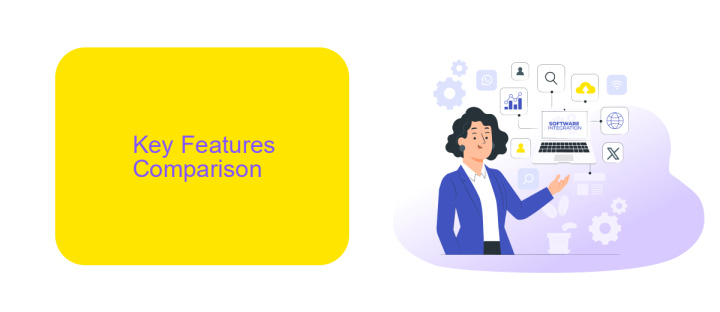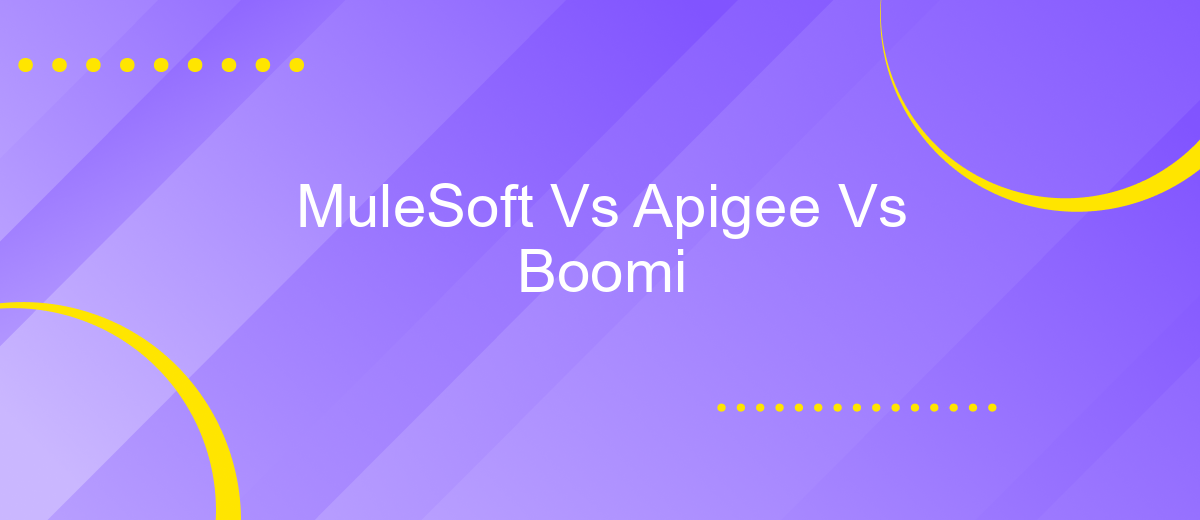MuleSoft Vs Apigee Vs Boomi
In the rapidly evolving landscape of integration platforms, choosing the right tool is crucial for seamless data connectivity and business agility. This article delves into a comparative analysis of three leading solutions: MuleSoft, Apigee, and Boomi. By examining their features, strengths, and use cases, we aim to provide insights that will help organizations make informed decisions tailored to their specific integration needs.
Introduction
In today's rapidly evolving digital landscape, businesses are increasingly relying on robust integration platforms to streamline their operations and enhance connectivity. MuleSoft, Apigee, and Boomi are three leading solutions that offer comprehensive tools for API management and integration. Each platform has its own strengths and unique features, making it crucial for organizations to choose the right one based on their specific needs.
- MuleSoft: Known for its powerful Anypoint Platform, MuleSoft provides extensive capabilities for API design, development, and management.
- Apigee: Acquired by Google, Apigee excels in API management and analytics, offering robust security and scalability.
- Boomi: A Dell Technologies business, Boomi focuses on cloud-native integration and is renowned for its ease of use and quick deployment.
Additionally, platforms like ApiX-Drive offer valuable solutions for automating integrations without the need for extensive coding, making it easier for businesses to connect various applications and services. By leveraging these integration platforms, organizations can enhance their operational efficiency, improve data flow, and ultimately drive better business outcomes.
Key Features Comparison

MuleSoft offers a robust platform for API management and integration, featuring Anypoint Studio for designing, testing, and deploying APIs. It supports a wide range of protocols and provides comprehensive tools for analytics and monitoring. MuleSoft's strength lies in its ability to handle complex integrations and its extensive library of pre-built connectors, making it a versatile solution for enterprises with diverse needs.
Apigee, by Google Cloud, excels in API management with a focus on security, scalability, and developer support. Its key features include advanced API analytics, customizable developer portals, and robust security policies. Apigee's seamless integration with Google Cloud services enhances its appeal for organizations already leveraging Google's ecosystem. On the other hand, Boomi, a Dell Technologies company, emphasizes ease of use with its low-code platform. Boomi's AtomSphere provides a unified environment for application and data integration, master data management, and API management. Its extensive connector library and user-friendly interface make it an excellent choice for businesses seeking quick and efficient integration solutions. Additionally, services like ApiX-Drive can complement these platforms by offering simplified integration setups and automation, further streamlining business processes.
Pricing Model Analysis

When comparing the pricing models of MuleSoft, Apigee, and Boomi, it's essential to consider the specific needs and scale of your business. Each platform offers a unique pricing structure that can cater to different integration requirements and budgets.
- MuleSoft: MuleSoft operates on a subscription-based model with various tiers depending on the number of users and the level of support required. Pricing is typically higher due to its extensive features and enterprise-level capabilities.
- Apigee: Apigee offers a flexible pricing model based on API calls. This pay-as-you-go approach can be cost-effective for businesses with fluctuating API usage. They also provide enterprise plans for larger organizations.
- Boomi: Boomi's pricing is based on the number of connections or integrations. They offer several tiers, including a free trial, making it accessible for small to medium-sized businesses.
For businesses seeking a more straightforward and cost-effective integration solution, services like ApiX-Drive can be an excellent alternative. ApiX-Drive provides a user-friendly platform with transparent pricing, making it easier for businesses to manage their integrations without the complexity and high costs associated with enterprise solutions.
Use Cases and Market Share

MuleSoft, Apigee, and Boomi are prominent players in the integration platform market, each catering to different use cases. MuleSoft is often chosen for its robust capabilities in connecting enterprise applications and data across on-premises and cloud environments. Apigee, on the other hand, is favored for its API management features, making it a go-to for businesses looking to streamline their API strategies. Boomi excels in providing a low-code platform for rapid integration, making it ideal for organizations seeking quick deployment.
These platforms serve a wide range of industries, from finance and healthcare to retail and manufacturing. They facilitate seamless integration, allowing businesses to enhance operational efficiency and customer experiences.
- MuleSoft: Enterprise-level application and data integration
- Apigee: Comprehensive API management and strategy
- Boomi: Rapid, low-code integration deployment
In terms of market share, MuleSoft holds a significant position due to its extensive enterprise capabilities. Apigee is a leader in API management, supported by its acquisition by Google. Boomi, with its user-friendly interface, is popular among small to medium-sized businesses. Additionally, services like ApiX-Drive are gaining traction for their ability to simplify integration processes, making them valuable for businesses of all sizes.
Conclusion and Recommendations
When choosing between MuleSoft, Apigee, and Boomi, it's crucial to consider the specific needs and goals of your organization. MuleSoft excels in providing a comprehensive integration platform with robust API management capabilities, making it ideal for large enterprises with complex integration requirements. Apigee, on the other hand, is known for its strong API management and security features, which are particularly beneficial for organizations that prioritize API-first strategies. Boomi stands out for its ease of use and rapid deployment, making it a great choice for small to medium-sized businesses looking to streamline their integration processes quickly.
For companies seeking an efficient way to set up integrations without extensive technical expertise, services like ApiX-Drive can be a valuable addition. ApiX-Drive offers user-friendly tools to connect various applications and automate workflows, complementing the capabilities of MuleSoft, Apigee, and Boomi. By leveraging the strengths of these platforms and integrating them with ApiX-Drive, organizations can achieve a more seamless and efficient integration strategy tailored to their unique needs.


FAQ
What are the primary differences between MuleSoft, Apigee, and Boomi?
Which platform is best for a company with extensive API requirements and microservices architecture?
How do these platforms handle data integration with third-party applications?
What are the cost considerations for choosing between MuleSoft, Apigee, and Boomi?
Are there any alternatives for small to medium-sized businesses looking for simpler integration solutions?
Strive to take your business to the next level, achieve your goals faster and more efficiently? Apix-Drive is your reliable assistant for these tasks. An online service and application connector will help you automate key business processes and get rid of the routine. You and your employees will free up time for important core tasks. Try Apix-Drive features for free to see the effectiveness of the online connector for yourself.

